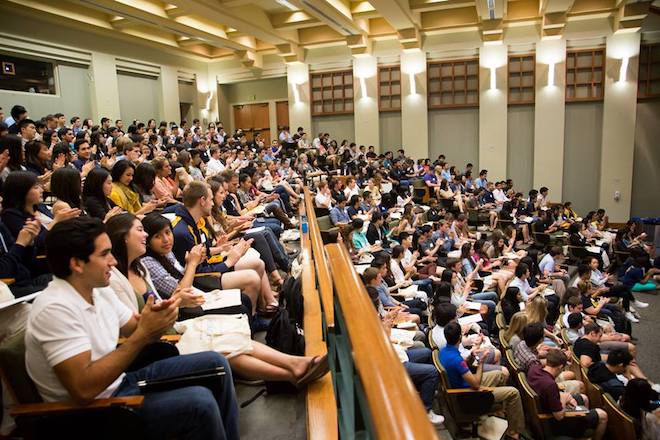
UC-Berkeley Haas School of Business
“When your technology changes the world, you bear a responsibility to address the world you helped to create.”
“One of the greatest qualities you can have is being curious…Look for things that others don’t look for. Be committed to being a lifelong learner.”
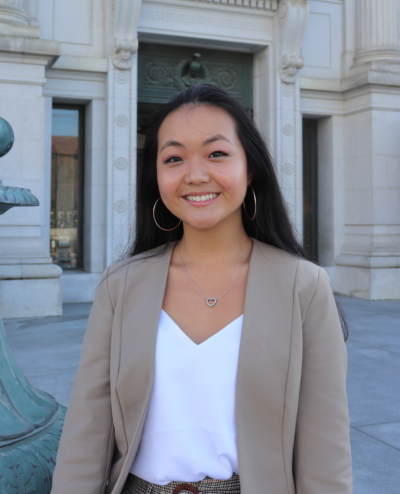
Grace Huang
What do these quotes have in common? Some Haasies can say they are pearls of wisdom from our Dean. Others can say these are quotes from Haas professors sprinkling a little bit of knowledge during their lectures.
These are all reasonable guesses, but they are all wrong.
The first quote is from Brad Smith, President of Microsoft, talking about the intersection of Technology and Human Rights. The second is from Al Kelly, Chairman & CEO of Visa offering Haas students the same advice he would give to his employees. Each are sound bites from their appearances for Haas’ Dean Speaker Series.
Haas’ Dean Speaker Series has been hosting preeminent business leaders for decades, offering Haas students a new perspective and an open window into industries where we may want to potentially work. Currently, our series is called “New Thinking in a Pandemic,” where business leaders and thinkers discuss how the COVID-19 pandemic will shape our near future and what we can do to adapt.
“Our Dean’s Speaker Series is a regular event that allows our community to hear from business leaders, academics, community leaders and other thought leaders,” explains Haas Dean Ann Harrison. “Last year we had many exciting speakers, including the CEO of Visa Al Kelly, our very own David Aaker, and Laurene Powell Jobs. Each event also provides the opportunity for our community to ask questions during a lively session at the end of each event.”
Each talk is different, but all talks are thought-provoking and engaging. It’s the perfect opportunity for students to hear real-world insights from the people who know. Especially during this pandemic, these events may be more valuable than ever.
Here are the highlights from three recent talks:
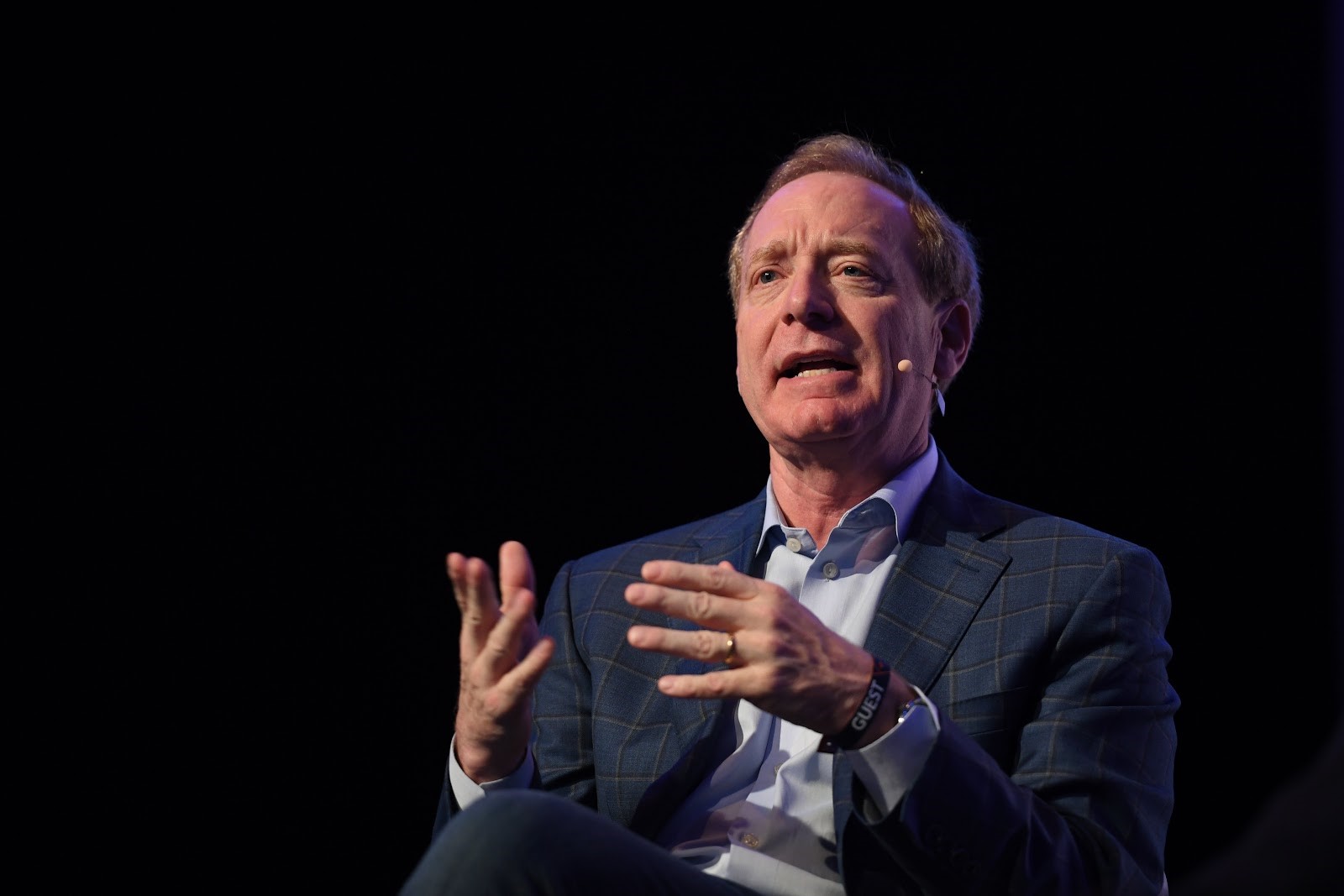
Brad Smith, Photo by Harry Murphy/Web Summit)
Brad Smith, President, Microsoft at Berkeley Haas | Leading in Times of Crisis
Speaker Background
Brad Smith is the President and Chief Legal Officer of Microsoft. He leads a team of over 1,400 legal and corporate affairs professionals. And, he is a staunch supporter of business being involved with societal matters like cybersecurity, human rights, and environmental sustainability. In fact, he has been dubbed the “de facto ambassador of the technology industry at large.”
Subject Matter
In his talk, Smith addressed the role that Microsoft, and Big Tech in general, plays in responding to crises. Whether this means continuing to pay wages during a pandemic or figuring out the best way to protect privacy while contact tracing, he believes in the responsibility tech firms have to you and me and society.
Takeaway
When asked about the accessibility of tech, Smith indicated where the focus should be…
Broadband.
With an increasingly tech-heavy world, connectivity to the internet is the tool of the present to improve the future. What separates the haves and the have nots is broadband.
Not to mention, COVID-19 has really accelerated the digitization of the economy. Students are learning through a camera lens. Patients are calling their doctors instead of heading to the doctor’s office.
Smith also talked about how when rural communities lag behind cities in internet access, it cuts a whole population from advancing in terms of jobs, education, and health. “We need to recognize that broadband is functionally the electricity of the 21st century,” he said.
This conversation reminded me of my first Microeconomics class. My professor projected pictures of the world at night. Some areas of the world were illuminated like broadway lights, while other parts were pitch black. The professor used this as a measure of the economic state of each country we looked at. Light meant a developing or developed nation. Darkness meant an undeveloped nation. Listening to Smith, I realized that broadband will be the next indicator even if it’s not as visible as light in a dark sky.
This is just one example of how listening to these prominent speakers can enhance the learning that we do in the classroom.
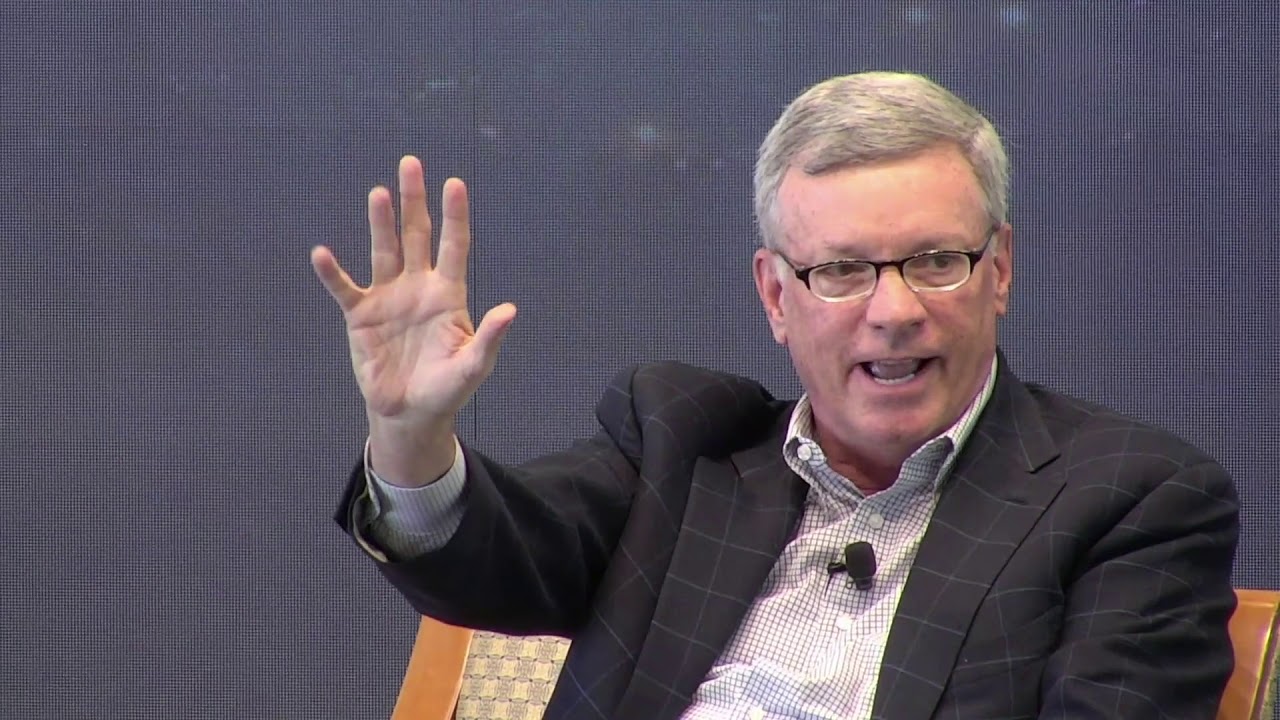
Al Kelly (Photo from YouTube)
Al Kelly at Berkeley Haas | Leading in FinTech
Speaker Background
Al Kelly has been the CEO of Visa since 2016 and Chairman of the board since 2019. He leads a company with over 180,000 employees with operations all around the world. Previously, he has acted as the Chairman of the Papal Visit Committee in 2015 and Chairman, CEO, and President of the NY/NJ Super Bowl Host Committee in 2014.
Subject Matter
Touching upon the growth of digital payments, Al Kelly offered his thoughts on opportunities like the expansion of services into bank-deserts and expansion of payment processing products in the digital marketplace. He wants Visa to invest in “low tech solutions that anybody with an idea to sell any good or service to be able to accept digital payments right away.”
Takeaway
Visa is a household name for those trying to obtain debit and credit cards. Every single day, they process $500 million dollars in transactions. However, Kelly noted that there are still 1.7 billion people in the world who don’t have a bank and are out of the financial mainstream.
When asked about the future of FinTech, Kelly passionately talked about reaching these people. Unlike most of the developed world — where you can find a bank or ATM on nearly every single street corner — there are still places where such common amenities don’t exist. Kelly gave the audience a very clear lesson in problem identification and recommendation. Visa’s future growth is being primed to come from offering pre-paid cards on phones to populations that haven’t even heard of a bank.
Here is why it is so important. In Accounting class, we learn that you only make a loan when you can expect a positive return on investment through interest and principal. Taking this concept to Botswana or Nigeria, for example, a microloan can pay off dividends in more than just profit. It can also fund a startup that may offer financial freedom for women. This kind of work meshes social corporate responsibility with future profitability — and that’s what gets Haas students up in the morning!
This talk offers students a glimpse into the financial services industry and banking industry, which many have aspirations to pursue post-graduation.
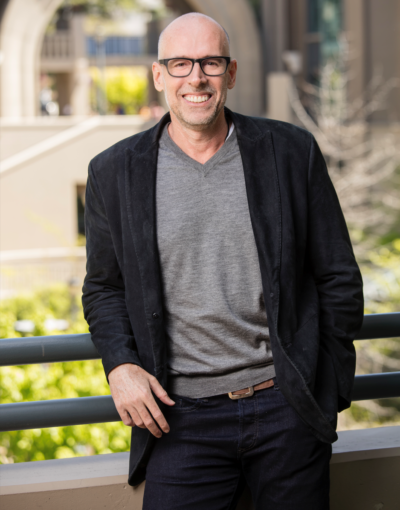
Scott Galloway (Photo by Jim Block)
Thriving Amidst Adversity: Scott Galloway NYU Professor and Haas Alumnus
Speaker Background
Scott Galloway is a lecturer at NYU Stern, author of two books, entrepreneur, and Haas MBA Alumnus (‘92). He has served on the Board of Directors for Eddie Bauer and the New York Times. In 2012, he was named by Poets and Quants as “One of the World’s 50 Best Business School Professors”.
Subject Matter
This talk is honest — even brutal — about how COVID-19 has permanently shaken up the world of education and healthcare. Galloway touches on the viability of higher education, the truth about entrepreneurship, and what business school graduates should do to stay resilient.
Takeaway
If you asked the Class of 2020 what they were expecting post-graduation in January, they would not have said, “I think we are entering the workplace during one of the deepest recessions the United States has ever faced.”
Among the many questions posed by MBA students during his talk, this one stood out: “What does it mean to be happy in the age of Corona?”
He encouraged the audience to invest during variance. What’s variance? Think racing. If you are accelerating while everyone else is accelerating, you might be able to inch forward from the next car but this doesn’t always prove to be a winning strategy. Rather, you want to accelerate when other people are not trying to get ahead. That’s variance.
During this pandemic, there is a ton of variance. “Some people are getting nothing done. Some people are getting something done. And, some people are getting a lot done… There is more opportunity right now to lap the competition when others are making no progress at all professionally.”
During this pandemic, I don’t think I have heard a better piece of advice to stay productive and motivated. Especially during a time when things are so uncertain and momentum has to be manufactured, this is really powerful stuff.
In Closing
The real value of this speaker series is two-fold. It isn’t just great sound bites, which there are. It’s also the collaboration and community that is nurtured. Students can receive practical advice from leaders of the business world, enhance the learning that is going in the classroom, and take a one hour deep dive into a variety of different industries.
Come Fall 2020, this Speaker Series is going to be one of the best ways for Haasies to come together and learn from each other, even if only through Zoom.
Editor’s Note: Look out for the latest edition of the “New Thinking in a Pandemic” series with psychologist and Professor Angela Duckworth from the University of Pennsylvania talking to Berkeley Haas Professor Don Moore. She is a bestselling author of Grit: The Power of Passion and Perseverance. You’ll be able to watch it here.
My name is Grace Huang, a rising senior studying Business Administration at the University of California-Berkeley’s Haas School of Business and a member of the founding class of the Global Management Program. Passionate about traveling, writing, running, and finding the perfect scrambled egg recipe, I want to explore the world at the speed New Yorkers walk.











Questions about this article? Email us or leave a comment below.